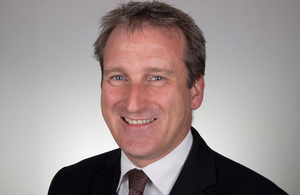Education Secretary to work with sector on special needs funding
Damian Hinds asks schools, colleges and local authorities how the funding system for pupils with special needs and disabilities could improve

Education Secretary Damian Hinds
In a speech to the National Association of Head Teachers (NAHT) today (3 May 2019), the Education Secretary will launch a Call for Evidence on the funding arrangements for pupils with complex Special Educational Needs and Disabilities (SEND) and praise the work of schools, teachers and support workers for enabling those pupils to achieve great outcomes.
Over a quarter of a million pupils with the most complex needs have benefited from personalised Education, Health and Care Plans since 2014, giving them the tailored support they need to thrive. Alongside this the High Needs Budget, money set aside for pupils with SEND and those in alternative provision, has risen from £5 billion in 2013 to over £6 billion today.
But as we approach the Spending Review, Education Secretary Damian Hinds will ask schools and colleges for their views on how to make funding arrangements for pupils with special educational needs and disabilities more effective.
As the needs of children are changing, the support that schools are providing reflects this additional complexity.
There are now almost 120,000 pupils with Education, Health and Care Plans who are continuing their education in mainstream schools, while the number of pupils whose needs are being met in special schools has risen to over 112,000 in the last five years.
The Secretary of State will say:
Teachers change lives, we all know this, and nowhere more so than in the incredible work they do to support children with special educational needs and disabilities. They have my huge admiration and thanks for that work.
We introduced Education, Health and Care Plans to help that work and thousands of children with the most complex needs are now receiving more tailored support to help their learning. That support needs investment and while we have already hugely increased spending in this area, I recognise that providing for additional complexities can put additional pressures on schools.
Following this huge reform, I want to make sure we have the best understanding of how our system for funding children with high needs is operating on the ground – and whether there are improvements we can make so every pound of public money we spend is building opportunities for young people.
I’ve made clear that I will back head teachers to have the resources they need to provide the best education possible for every child – that ambition is no different for children with SEND, nor should it be. So I hope teachers and leaders will work with me to lead a system that unlocks every child’s potential.
Since bringing in Education, Health and Care plans, the department has continued to invest in provision for children and young people with SEND. In December 2018 the Education Secretary announced that he would provide an extra £250 million up to 2020 to help local authorities manage high needs cost pressures, as well as £100 million funding to create more SEND places in mainstream schools, colleges and special schools.
An additional £31.6 million has also been invested to train more than 600 new Educational Psychologists, who are critical in identifying special educational needs and carrying out assessments.
These changes have increased the amount of tailored support children and young people with SEND are receiving but it has increased demands on the education sector.
The department will now work with all those involved in the SEND system to hear directly about how it can work better to improve outcomes for young people and whether funding could be distributed more effectively.
The call for evidence launches today and will run until 31st July.
Further information:
- We introduced Education, Health and Care (EHC) plans so that support can be tailored to each individual to better prepare young people for adulthood and improve their outcomes.
- In March, we confirmed funding of over £30 million to train more Educational Psychologists to help meet increasing demand for their services. We are launching three new training rounds from 2020 which will see over 600 new Educational Psychologists trained to make sure there is a sufficient supply to be able to help to carry out the EHC plan process.